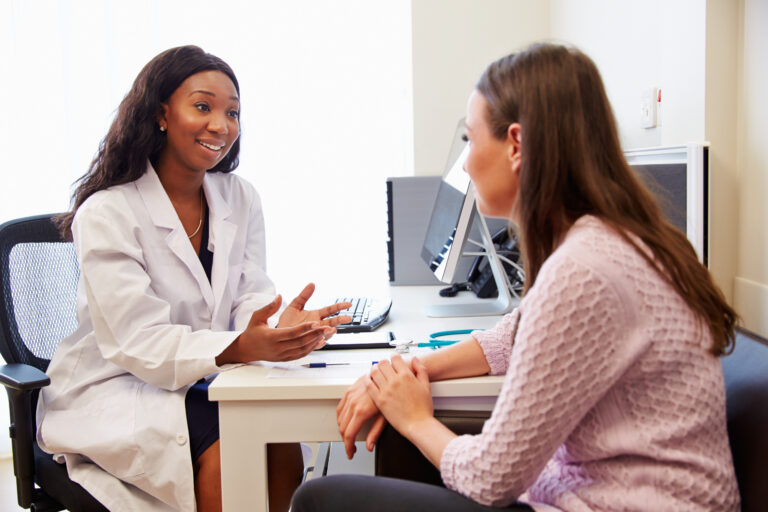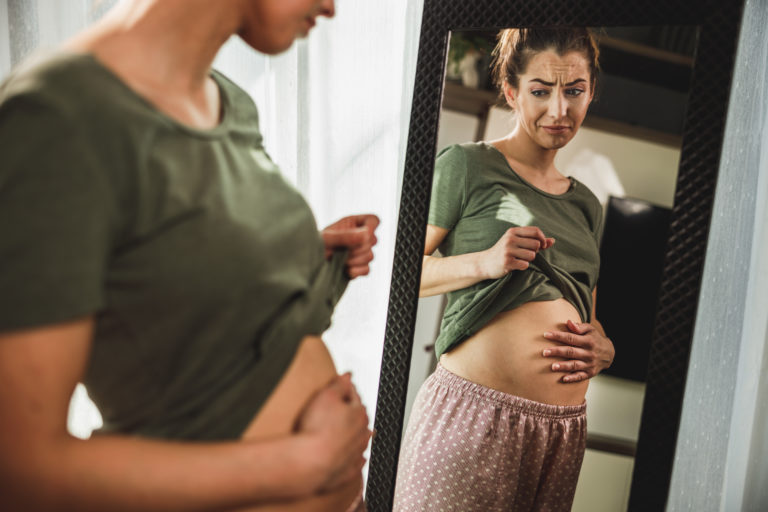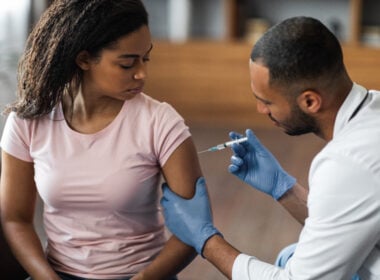If you experience chronic pelvic pain, on one or both sides, you may be suffering from ovarian cysts. Different types of ovarian cysts exist, and some are more serious than others. Knowing the type of cysts you have and what causes them is an important part of getting the right kind of treatment.
What are ovarian cysts?
An ovarian cyst is a fluid-filled sac that develops on the surface of (or within) a woman’s ovary. Ovarian cysts are actually very common, and most women will experience one at some point. In fact, many women are unaware that they have ovarian cysts, as they typically cause little discomfort and tend to go away on their own.
Functional ovarian cysts
Important: A cyst may warrant immediate attention if a woman experiences sudden, severe pain in the lower abdomen, especially if it is accompanied by nausea or vomiting, and/or fever. This can be a sign of ovarian torsion or cyst rupture.
Functional cysts are the most common type, and they are related to the normal activities of the ovaries; that is, the monthly maturation and bursting of a follicle leading to the release of an egg. A follicular cyst can develop if the follicle matures but fails to release an egg.
Typically, the remains of the follicle will transform after the release of the egg, and become what’s called the corpus luteum. The corpus luteum is responsible for pumping out the progesterone that maintains an early pregnancy, should one occur. But if the follicle fills with fluid after the egg is released and then closes up again, it can form a corpus luteum cyst.
Functional cysts are typically not serious, and they tend to go away on their own. However, if cysts become bigger and do not naturally resolve, a woman may experience pelvic or lower abdominal pain or bloating. In this case, she may need to see her doctor to determine whether treatment is needed.
A careful evaluation, as well as a review of your menstrual cycle charts, pelvic examination, and possibly a pelvic ultrasound, will help determine the type and treatment of your cyst(s). Menstrual charting can be learned from a certified instructor of a fertility awareness method (FAM) such as the Creighton FertilityCare Method or FEMM.
In some cases, cysts are associated with risks of cancer. It is therefore imperative to understand the type and root cause of these cysts.
What is PCOS?
Some women’s ovaries are prone to developing many cysts, which can lead to enlarged ovaries. A woman with these kinds of cysts has Polycystic Ovary Syndrome (PCOS). PCOS is a serious condition that affects an estimated 5 to 10% of U.S. women of reproductive age. Hallmarks of PCOS are symptoms of severe cramping and pain around one’s period, as well as very long cycles between periods. PCOS is also a common cause of infertility.
While the exact cause of PCOS is unknown, some researchers think that the disease develops in women who have had an excess of exposure before birth (that is, in their mother’s womb) to a hormone called the anti-Müllerian hormone.
Many women suffer from PCOS without knowing it. Estimates suggest that as many as 75% of women with PCOS are undiagnosed. This may be due to the wide variety of symptoms women with PCOS can present with and/or misconceptions that these symptoms are “normal,” especially if a woman’s mom or female relatives experienced the same ones.
PCOS symptoms can include:
- severe cramps
- long or irregular cycles
- heavy bleeding during menstruation
- cystic acne
- chronic fatigue
- chronic inflammation
- cardiovascular issues
- Type 2 Diabetes
- poor body image or eating disorders
- hair loss or growth
- high levels of androgens (“male” hormones)
- male-pattern hair growth (hirsutism)
- thyroid disorders
PCOS symptoms may also include:
Anxiety and depression
Studies have found that depression and anxiety are more prevalent in women with PCOS. The reasons for this are complex, as noted in a study in the Indian Journal of Psychological Medicine. Causing undesirable physical side effects to potential infertility, PCOS “can be deeply stigmatizing to women. In a qualitative study on the subjective experience of PCOS, women described as feeling robbed of their self-concept, essence of being feminine, and attractive.”
Insulin resistance and easy weight gain
According to the Cleveland Clinic, women with PCOS do not produce normal amounts of insulin. “Many women who have PCOS also have insulin resistance, which happens when the body has difficulty pulling glucose from the bloodstream and converting it to energy. Therefore, the body needs to produce more insulin in attempt to maintain a normal blood sugar level. Over time, the body begins to overproduce insulin to keep blood sugar level normal.” Insulin resistance may then, in turn, lead to obesity. All together, the connection between PCOS and insulin resistance can lead to a frustrating cycle where, as a woman gains weight, her PCOS symptoms can become more severe.
Infertility
Irregular cycles due to PCOS can affect your ability to get pregnant because you may ovulate less frequently and ovulation is necessary for conception. PCOS is the most common cause of infertility in women. The hormonal imbalances of PCOS interfere with ovulation, which can lead to irregular or completely skipped periods, making it difficult or impossible to get pregnant. However, there are some restorative reproductive medicine techniques and treatments that can help restore ovulation, and improve one’s chances of pregnancy.
Can PCOS be cured or reversed?
As of now, there is no cure for PCOS. Symptoms can be relieved by changes to diet and lifestyle, hormonal supplementation, and/or certain surgical procedures. Disease progression can be monitored with charting and other diagnostic technologies.
Some women with PCOS “have found success with a unique diet, moderate exercise, and use of a progesterone cream,” Lindsay Schlegel wrote in an article for Natural Womanhood, “How to Solve Period Issues without the Pill.” A bioidentical form of progesterone may “help regulate the hormones during the woman’s cycle, and thus establish more regular ovulation, with virtually no side effects, because the product is a replica of what the body produces on its own.”
NaProTechnology is also advancing the treatment of PCOS. PCOS can be treated with a surgical wedge resection procedure, which reduces the size of the ovaries. Although it currently isn’t a cure, the surgery can provide symptom relief, especially when coupled with diet and other lifestyle improvements (always speak to a doctor before making any major diet changes or taking new supplements).
If you are currently on hormonal birth control (a common prescription for women suffering from symptoms of cysts or PCOS), be aware that hormonal contraceptives do not treat the underlying cause of your PCOS. Further, being on contraceptives will make it impossible to accurately chart your cycle and get to the bottom of what type of cysts you are experiencing.
What should I do if I think I have PCOS?
If you have some of these symptoms, learning to chart your menstrual cycle using a fertility awareness method can be a good first step toward identifying any irregularities in your cycle that might be indicative of PCOS. When consulting with a doctor who understands FAMs, your fertility charts can help speed up your diagnosis, and get you on the path to treatment faster. Be sure to also share your full family history (as PCOS seems to run in families), and do not downplay your symptoms.
What doctors can help treat PCOS?
To find a medical professional trained in fertility awareness and restorative reproductive medicine, to discuss your symptoms and treatment options, click this link. Note that many of these doctors and medical professionals are available by telehealth, and some provide financial assistance.
This page was last updated on April 11, 2024.
For more information on PCOS and cysts, see the articles below.
-

Irregular menstrual cycles in teen girls can predict future metabolic syndrome
By Kristen Curran • September 30, 2023As far as irregular cycles go, having too few periods might sound like a best-case scenario for many… -

Misconceptions your doctor might have about NFP and fertility awareness, and how to respond to them
By Clare Sharp • August 17, 2023When I had my first visit with an OB-GYN, I was already in my mid-twenties. I was blessed… -

Is it time to rethink Clomid as an infertility treatment?
By Kristen Curran • August 3, 2023Modern medicine often has things backwards when it comes to women’s health. Far from “regulating” hormone levels, hormonal… -

What causes painful periods, aka dysmenorrhea?
By Madison Ayers • June 9, 2023Have you ever missed school or work due to a heavy, painful period? Stayed home and canceled plans… -

Why have my periods stopped? Exploring the causes of secondary amenorrhea
By Jasmine Adams • March 17, 2023In part 1 of this 3-part series on amenorrhea, I covered the causes of primary amenorrhea, which occurs… -

“The menstrual cycle is a vital sign of your health:” A women’s health NP explains why every pre-teen girl needs to learn about her cycle
By Anne Marie Williams, RN, BSN • December 8, 2022Back in August 2022, we reviewed The Happy Girl’s Guide to Being Whole: What You Never Knew about… -

Natural Womanhood Book Review: The Happy Girl’s Guide to Being Whole
By Anne Marie Williams, RN, BSN • August 12, 2022Increasingly, women are turning to fertility awareness methods (FAMs) not just for pregnancy prevention, but specifically as health… -

What is “endo belly,” and how can you manage an endo belly flare?
By Morganne Skinner, BSN, RN • August 4, 2022From the very first time I experienced endo belly, I knew without a doubt that something was wrong.…






